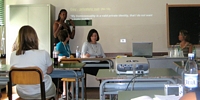The following are ways to improve memory problems:
- Make a list of what can be remembered from the previous day. i.e.: what was eaten for breakfast, lunch and dinner; what was done in the morning, afternoon and evening; who was spoken to, and what were the conversations about.
- Have the injured person read the newspaper and then later in the day, or the next day query him/her on what the article or articles were about.
- Similarly, ask him/her what they remember of something they were told one, two or three days previously.
- After going for a drive or an outing, two or three days later ask him/her what they remember of the event. i.e.: was the server a male or a female; what had they ordered to eat; what had the weather been like, or anything specific about what had been seen, heard or done.
- Be purposefully aware in any new situation in order to be able to remember events and anything specific. For example: forgetting where you parked your car at the mall may not be solely a matter of forgetting as it is of not taking special note when you left your car of where you did park it - it may be more of an issue of awareness.
- Listen carefully. Often the fact of just having listened will be of help when trying to remember people and conversations. This is particularly true when being introduced to new people.
- Internally repeat new things, like the name of a person when being introduced. Anything that is repeated has a better chance of being remembered.
- This also includes anything that is written down. Writing something down places the incident more firmly into the memory bank. Keeping a daily diary or journal will help because the process of writing in it will assist the memory plus there will be a record to refer to for help in remembering.
- Carry a notebook to record such things as new people's names, appointments, to-do lists and any other pertinent information to assist with memory.
- Another idea is: if there were bread, milk, eggs, potatoes and cereal to pick up at the store, it helps to remember what the items are if the number of items is remembered.
Practicing the above exercises will help with memory difficulties. Many of the exercises for short-term memory problems can help any one of us but particularly those who have sustained a brain injury.
Additionally, there are other problems that will interfere with memory. Fatigue - when someone is tired, it is difficult to be 'on top of things' and to be able to remember. Anxiety will also interfere with memory. i.e.: if you are nervous when you meet someone new, it may make it more difficult to remember their name.
The effort to improve short-term memory is like everything else. It will take effort and perseverance. Nothing comes easily so the desire to improve one's memory has to be important to that person.



